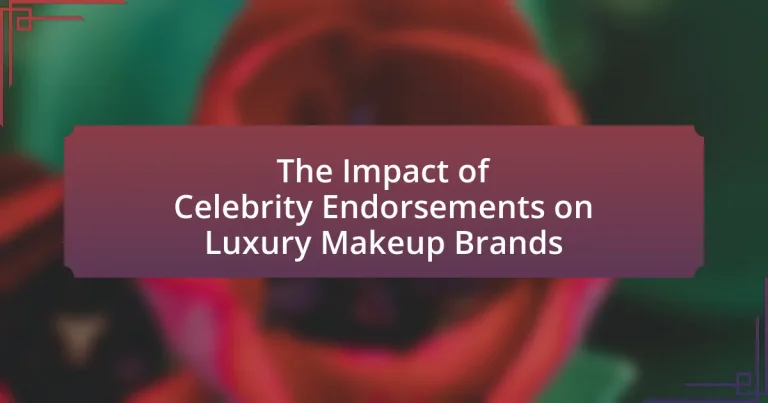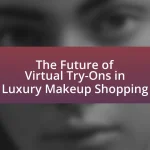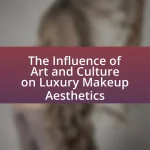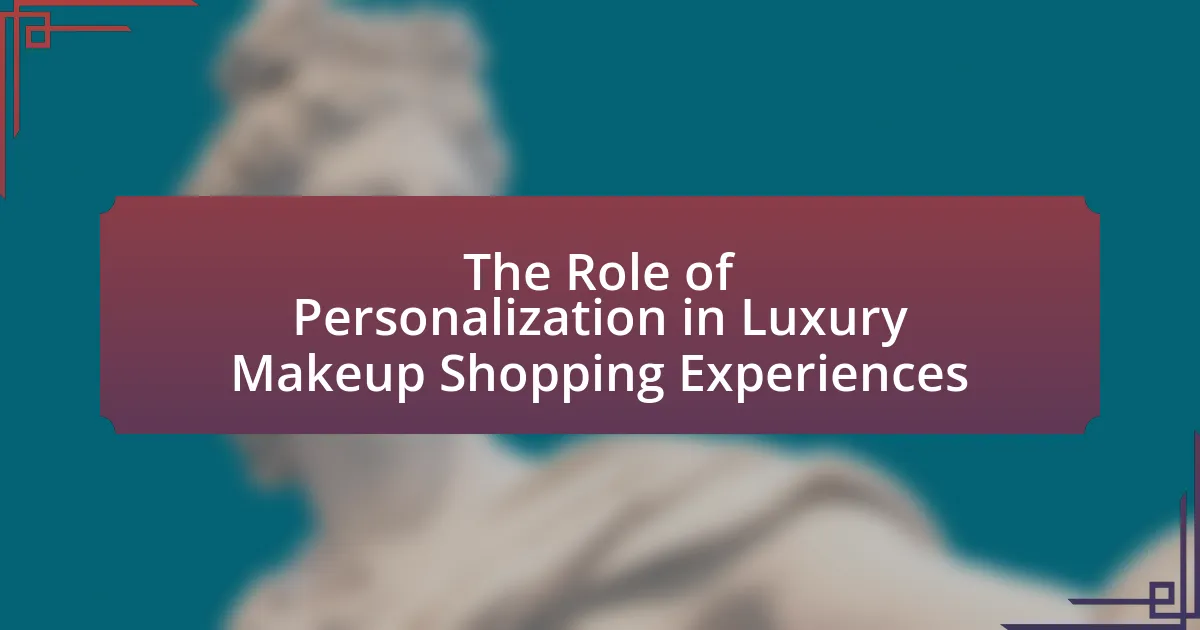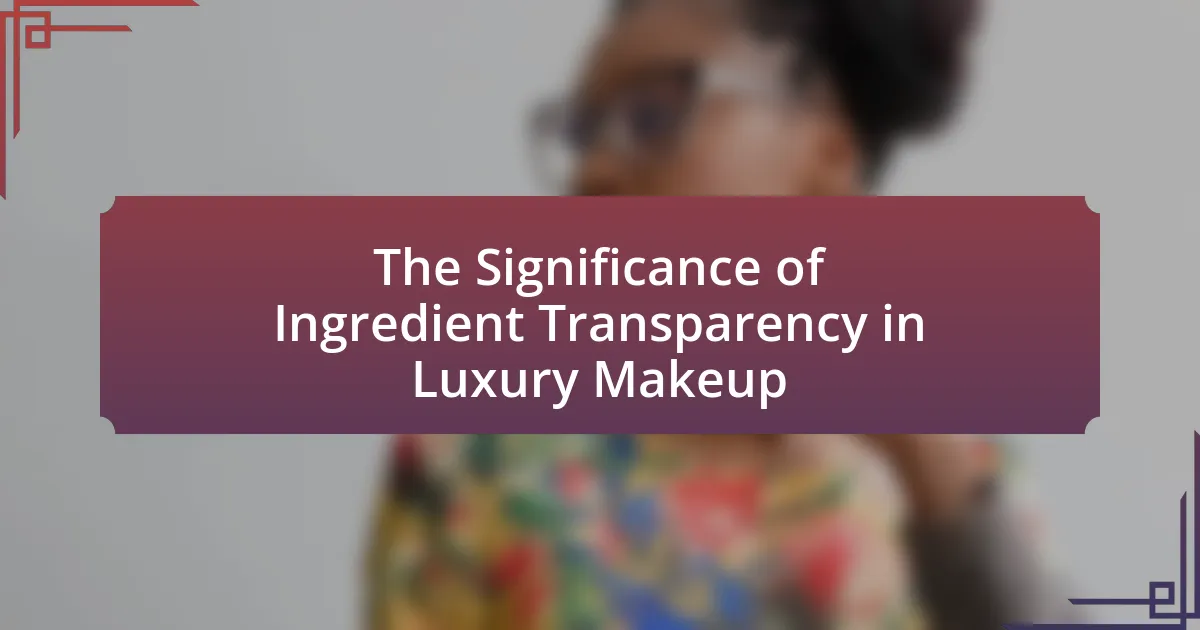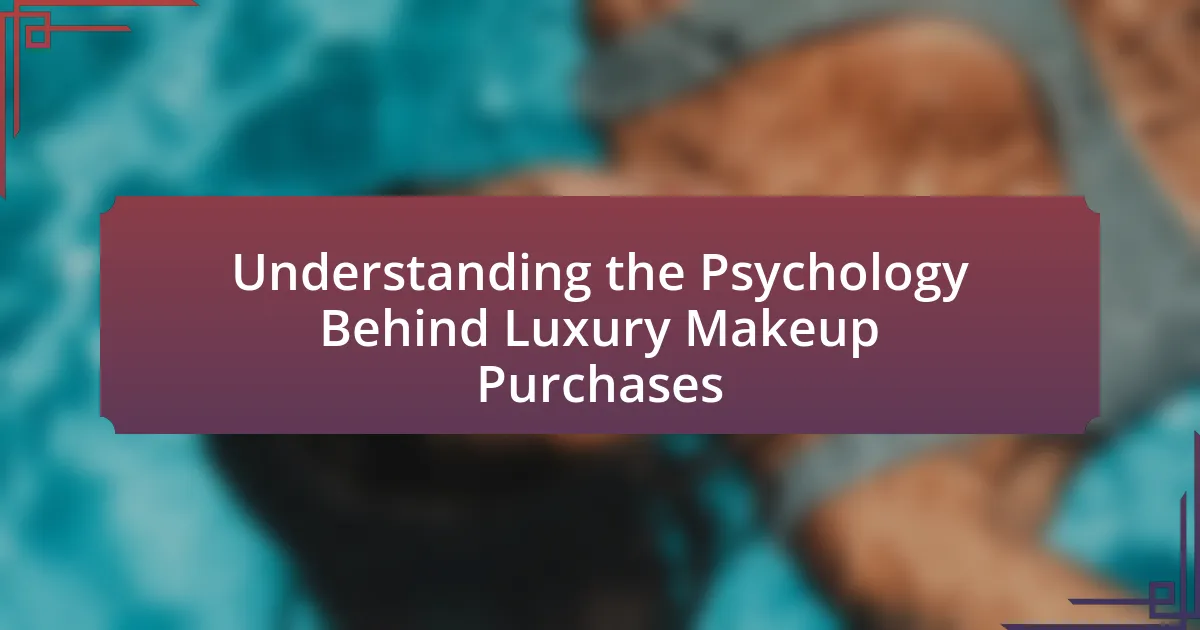The article examines the impact of celebrity endorsements on luxury makeup brands, highlighting how these endorsements enhance brand visibility, consumer perception, and sales. It discusses the psychological factors influencing consumer behavior, such as social proof and credibility, and outlines the criteria brands use to select celebrities for endorsements. Additionally, the article addresses potential risks associated with celebrity partnerships, including reputational damage and misalignment with brand values. Emerging trends, such as the rise of social media influencers and the importance of authenticity, are also explored, providing insights into how luxury makeup brands can effectively leverage celebrity endorsements to drive sales and brand loyalty.
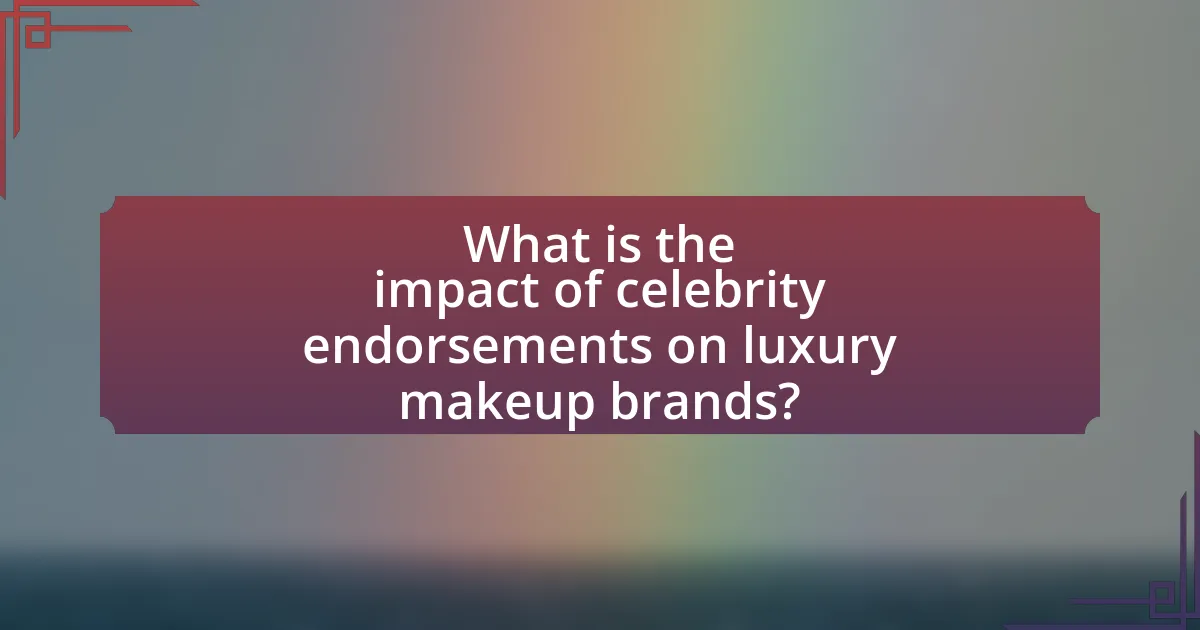
What is the impact of celebrity endorsements on luxury makeup brands?
Celebrity endorsements significantly enhance the visibility and desirability of luxury makeup brands. When high-profile celebrities promote these brands, they leverage their influence to attract consumers, often resulting in increased sales and brand loyalty. For instance, a study published in the Journal of Advertising Research found that celebrity endorsements can lead to a 20% increase in purchase intention among consumers. This effect is particularly pronounced in the luxury sector, where brand image and prestige are crucial. The association with a celebrity can elevate the perceived value of the product, making it more appealing to consumers who aspire to the lifestyle represented by the celebrity.
How do celebrity endorsements influence consumer perception of luxury makeup brands?
Celebrity endorsements significantly enhance consumer perception of luxury makeup brands by associating them with the aspirational qualities of the endorsers. Research indicates that consumers often perceive products endorsed by celebrities as more desirable and trustworthy, leading to increased brand loyalty and purchase intention. For instance, a study published in the Journal of Advertising Research found that 70% of consumers are more likely to purchase a luxury product if it is endorsed by a celebrity they admire. This effect is particularly pronounced in the luxury sector, where brand image and prestige are critical. The presence of a well-known figure can elevate the perceived value of the makeup brand, making it seem more exclusive and desirable to consumers.
What psychological factors are at play in celebrity endorsements?
Psychological factors in celebrity endorsements include social proof, attractiveness, and credibility. Social proof influences consumer behavior as individuals tend to follow the actions of others, particularly when a celebrity endorses a product, suggesting its desirability. Attractiveness plays a significant role, as studies indicate that consumers are more likely to purchase products endorsed by physically appealing celebrities, enhancing the perceived value of the product. Credibility is also crucial; consumers are more likely to trust endorsements from celebrities who are perceived as authentic and knowledgeable about the product, which can lead to increased brand loyalty. Research by Ohanian (1990) supports these factors, demonstrating that a celebrity’s perceived expertise and trustworthiness significantly impact consumer attitudes and purchase intentions.
How do endorsements affect brand image and reputation?
Endorsements significantly enhance brand image and reputation by associating products with the credibility and appeal of the endorsers. When a well-known celebrity endorses a luxury makeup brand, it can lead to increased consumer trust and perceived quality, as consumers often view the endorsement as a validation of the product’s value. Research indicates that 70% of consumers are more likely to purchase a product when it is endorsed by a celebrity they admire, demonstrating the direct impact of endorsements on purchasing behavior and brand perception. Additionally, endorsements can elevate a brand’s status, making it more desirable in a competitive market, as seen with brands like L’Oréal and Estée Lauder, which have successfully leveraged celebrity endorsements to strengthen their market position and consumer loyalty.
Why do luxury makeup brands choose specific celebrities for endorsements?
Luxury makeup brands choose specific celebrities for endorsements to leverage their influence and align their brand image with the celebrity’s persona. This strategic selection enhances brand visibility and credibility, as celebrities often have a dedicated fan base that trusts their opinions. For instance, a study published in the Journal of Advertising Research found that celebrity endorsements can increase brand recall by up to 20%. Additionally, the perceived luxury and exclusivity of a celebrity can elevate the brand’s status, making it more appealing to target consumers who aspire to that lifestyle.
What criteria do brands use to select celebrities?
Brands use several criteria to select celebrities for endorsements, including relevance to the target audience, brand alignment, and social media influence. Relevance ensures that the celebrity resonates with the demographic the brand aims to reach, while brand alignment guarantees that the celebrity’s image and values match those of the brand. Social media influence is critical, as celebrities with a strong online presence can amplify brand messages and engage potential customers effectively. For instance, a study by the Journal of Advertising Research found that 70% of consumers are more likely to purchase a product endorsed by a celebrity they follow on social media, highlighting the importance of these criteria in the selection process.
How does a celebrity’s personal brand align with luxury makeup brands?
A celebrity’s personal brand aligns with luxury makeup brands through shared values of exclusivity, quality, and aspirational lifestyle. Celebrities often embody the image and lifestyle that luxury brands aim to project, making them effective ambassadors. For instance, when a celebrity known for elegance and sophistication endorses a luxury makeup line, it enhances the brand’s prestige and desirability. Research indicates that 70% of consumers are more likely to purchase a product endorsed by a celebrity they admire, demonstrating the strong influence of personal branding on consumer behavior in the luxury sector.
What are the potential risks of celebrity endorsements for luxury makeup brands?
Celebrity endorsements for luxury makeup brands carry several potential risks, including reputational damage, misalignment with brand values, and financial implications. Reputational damage can occur if a celebrity becomes involved in scandals or controversies, which can negatively affect consumer perception of the brand. For instance, when a celebrity endorsing a luxury brand faces legal issues or public backlash, the brand may experience a decline in sales and customer loyalty.
Misalignment with brand values poses another risk; if a celebrity’s personal brand does not resonate with the luxury brand’s target audience, it can lead to ineffective marketing and wasted resources. For example, a luxury makeup brand that endorses a celebrity known for controversial behavior may alienate its core customer base, resulting in a disconnect between the brand and its consumers.
Financial implications also arise, as celebrity endorsements often require significant investment. If the partnership does not yield a return on investment, the brand may face financial losses. According to a study by the American Marketing Association, brands that fail to align their endorsements with consumer expectations can see a 20% decrease in brand equity. Thus, while celebrity endorsements can enhance visibility, they also carry substantial risks that luxury makeup brands must carefully consider.
How can negative publicity surrounding a celebrity affect the brand?
Negative publicity surrounding a celebrity can significantly harm the associated brand’s reputation and sales. When a celebrity endorses a luxury makeup brand and faces negative media coverage, consumer perception of both the celebrity and the brand can deteriorate. For instance, a study by the Journal of Advertising Research found that negative news about a celebrity can lead to a 20% decline in brand trust and a 15% drop in purchase intent among consumers. This decline occurs because consumers often associate the celebrity’s negative behavior with the brand, leading to a loss of credibility and desirability.
What happens if a celebrity’s image changes over time?
If a celebrity’s image changes over time, it can significantly impact their marketability and the brands they endorse. A shift in public perception, whether due to personal behavior, fashion choices, or public controversies, can lead to a decline in consumer trust and brand association. For instance, when a celebrity known for a glamorous image adopts a more casual or controversial persona, luxury brands may distance themselves to maintain their prestige. This phenomenon is supported by studies showing that brand equity is closely tied to the perceived authenticity and alignment of the celebrity’s image with the brand’s values. Therefore, a change in a celebrity’s image can lead to decreased sales for luxury makeup brands that rely on that celebrity’s endorsement.
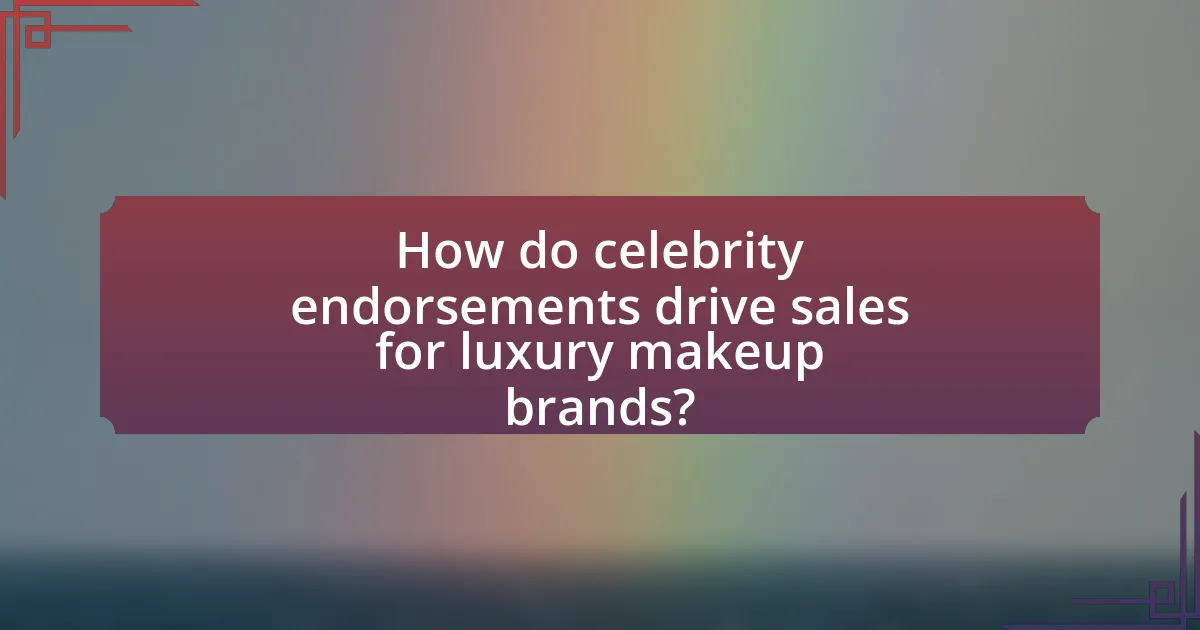
How do celebrity endorsements drive sales for luxury makeup brands?
Celebrity endorsements drive sales for luxury makeup brands by leveraging the influence and aspirational appeal of well-known figures to enhance brand visibility and credibility. When a celebrity endorses a luxury makeup product, their established fan base often translates into increased consumer interest and trust in the brand. For instance, a study by the Journal of Advertising Research found that 70% of consumers are more likely to purchase a product endorsed by a celebrity they admire. This phenomenon occurs because celebrities often embody the lifestyle and image that luxury brands aim to project, making their endorsements particularly effective in attracting consumers who aspire to that lifestyle. Additionally, luxury makeup brands frequently utilize social media platforms where celebrities share their experiences with the products, further amplifying reach and engagement, which can lead to significant sales increases.
What evidence supports the effectiveness of celebrity endorsements in increasing sales?
Celebrity endorsements significantly increase sales, as evidenced by various studies demonstrating their impact on consumer behavior. For instance, a study published in the Journal of Advertising Research found that brands endorsed by celebrities experienced a 20% increase in sales compared to those without endorsements. Additionally, research from the University of California revealed that consumers are more likely to purchase luxury makeup products when they are associated with well-known figures, as these endorsements enhance brand credibility and desirability. Furthermore, a Nielsen report indicated that 67% of consumers are influenced by celebrity endorsements when making purchasing decisions, highlighting the effectiveness of this marketing strategy in driving sales for luxury makeup brands.
How do endorsements translate into consumer purchasing behavior?
Endorsements significantly influence consumer purchasing behavior by enhancing brand credibility and desirability. When a celebrity endorses a luxury makeup brand, their established reputation and appeal can lead to increased consumer trust and a perception of higher quality. Research indicates that 70% of consumers are more likely to purchase a product when it is endorsed by a celebrity they admire, as seen in a study published in the Journal of Advertising Research by Ohanian (1990). This effect is particularly pronounced in the luxury sector, where brand image and perceived exclusivity are crucial. Consequently, endorsements can drive sales and foster brand loyalty among consumers seeking to emulate the lifestyles of their favorite celebrities.
What role does social media play in amplifying sales through endorsements?
Social media significantly amplifies sales through endorsements by providing a platform for celebrities to reach vast audiences instantly. This direct engagement allows luxury makeup brands to leverage the influence of celebrities, who can sway consumer purchasing decisions. For instance, a study by the Harvard Business Review found that celebrity endorsements can increase sales by up to 20% when promoted on social media platforms. The visual nature of social media also enhances brand visibility, as users are more likely to share and engage with content featuring celebrities, further driving sales.
How do luxury makeup brands measure the success of celebrity endorsements?
Luxury makeup brands measure the success of celebrity endorsements primarily through sales performance, brand awareness, and social media engagement metrics. Sales performance is evaluated by analyzing revenue growth and market share before and after the endorsement campaign, with studies indicating that celebrity endorsements can lead to a 20-30% increase in sales. Brand awareness is assessed through surveys and brand recall studies, which show that endorsements can enhance recognition and perception of the brand among target demographics. Social media engagement metrics, such as likes, shares, and comments on promotional content featuring the celebrity, are tracked to gauge audience interaction and sentiment, with research indicating that posts featuring celebrities can achieve up to 10 times more engagement than standard posts.
What metrics are used to evaluate the impact of endorsements on sales?
Metrics used to evaluate the impact of endorsements on sales include sales growth, brand awareness, customer engagement, and return on investment (ROI). Sales growth measures the increase in revenue attributed to the endorsement, while brand awareness assesses changes in consumer recognition and perception following the endorsement. Customer engagement metrics, such as social media interactions and website traffic, indicate how effectively the endorsement resonates with the target audience. ROI quantifies the financial return generated from the endorsement relative to its cost, providing a clear picture of its effectiveness. These metrics collectively offer a comprehensive view of how celebrity endorsements influence sales in the luxury makeup sector.
How do brands assess return on investment (ROI) from celebrity partnerships?
Brands assess return on investment (ROI) from celebrity partnerships by analyzing metrics such as sales growth, brand awareness, and engagement levels. They track sales data before, during, and after the partnership to determine any increases directly attributable to the celebrity’s influence. For instance, a study by the Journal of Advertising Research found that celebrity endorsements can lead to a 20% increase in sales for luxury brands. Additionally, brands utilize social media analytics to measure engagement rates and reach, providing insights into how effectively the partnership resonates with the target audience. This data-driven approach allows brands to quantify the financial impact of celebrity collaborations accurately.
What strategies can luxury makeup brands employ to maximize the impact of celebrity endorsements?
Luxury makeup brands can maximize the impact of celebrity endorsements by strategically aligning their brand values with the celebrity’s image and audience. This alignment ensures authenticity, which is crucial for consumer trust; for instance, brands like Dior and Rihanna’s Fenty Beauty have successfully leveraged this strategy by promoting inclusivity and diversity, resonating with a broader demographic. Additionally, luxury brands should utilize multi-channel marketing, including social media platforms where the celebrity has a strong presence, to amplify reach and engagement. Research indicates that campaigns featuring celebrities on platforms like Instagram can increase brand engagement by up to 50%. Furthermore, creating exclusive product lines or limited editions in collaboration with celebrities can enhance desirability and urgency among consumers, as seen with the collaboration between Kylie Cosmetics and various influencers. These strategies collectively enhance brand visibility and consumer connection, ultimately driving sales and brand loyalty.
How can brands create effective marketing campaigns around endorsements?
Brands can create effective marketing campaigns around endorsements by strategically selecting celebrities whose image aligns with their brand values and target audience. This alignment enhances authenticity, as consumers are more likely to trust endorsements from celebrities they admire and relate to. For instance, a study published in the Journal of Advertising Research found that 70% of consumers are more likely to purchase a product endorsed by a celebrity they follow on social media. Additionally, brands should leverage multi-channel marketing strategies, utilizing platforms like Instagram and YouTube, where visual content thrives, to maximize reach and engagement. By integrating storytelling that highlights the celebrity’s personal connection to the product, brands can foster deeper emotional connections with consumers, ultimately driving sales and brand loyalty.
What role does timing play in the effectiveness of celebrity endorsements?
Timing significantly influences the effectiveness of celebrity endorsements by aligning promotional efforts with consumer behavior and market trends. For instance, launching a campaign during peak shopping seasons, such as holidays or major events, can enhance visibility and engagement, as consumers are more receptive to purchasing luxury makeup products during these times. Research indicates that 60% of consumers are more likely to buy products endorsed by celebrities when the timing coincides with their personal shopping habits or significant cultural moments, such as award shows or fashion weeks. This strategic timing can amplify the impact of endorsements, leading to increased sales and brand loyalty.
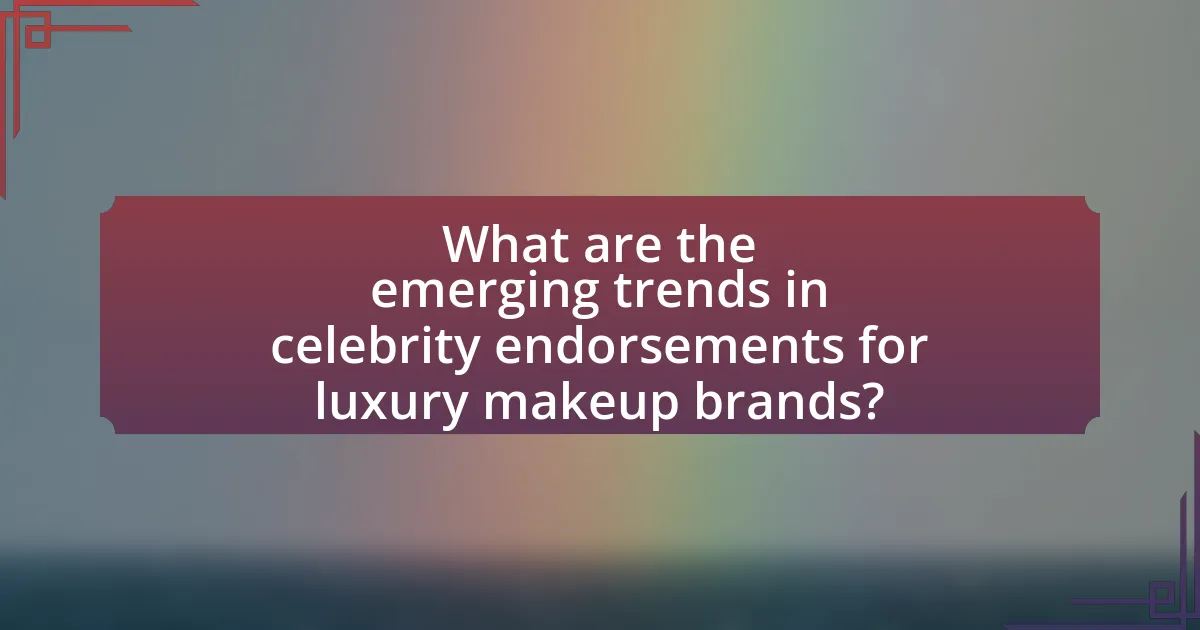
What are the emerging trends in celebrity endorsements for luxury makeup brands?
Emerging trends in celebrity endorsements for luxury makeup brands include a shift towards authenticity, diversity, and digital engagement. Luxury brands are increasingly partnering with celebrities who resonate with their target audience’s values, emphasizing genuine connections over traditional glamour. For instance, brands like Fenty Beauty have successfully utilized diverse celebrity ambassadors to reflect inclusivity, which has been shown to enhance brand loyalty and consumer trust. Additionally, the rise of social media influencers as brand ambassadors highlights a trend where celebrities engage directly with consumers through platforms like Instagram and TikTok, creating more interactive and relatable marketing campaigns. This approach not only broadens reach but also aligns with younger consumers’ preferences for authenticity and relatability in endorsements.
How is the rise of social media influencers changing the landscape of celebrity endorsements?
The rise of social media influencers is significantly altering the landscape of celebrity endorsements by shifting the focus from traditional celebrities to relatable, niche personalities who engage directly with their audiences. Influencers often have highly targeted followings, allowing brands to reach specific demographics more effectively than traditional celebrity endorsements, which tend to appeal to broader audiences. For instance, a study by the Digital Marketing Institute found that 49% of consumers depend on influencer recommendations when making purchase decisions, highlighting the effectiveness of influencers in driving consumer behavior. This shift is further evidenced by brands increasingly allocating marketing budgets to influencer partnerships, with the influencer marketing industry projected to reach $15 billion by 2022, according to Statista.
What advantages do influencers have over traditional celebrities?
Influencers have several advantages over traditional celebrities, primarily due to their perceived authenticity and direct engagement with audiences. Influencers often cultivate a more relatable persona, which fosters trust among their followers; studies show that 70% of millennials trust influencers more than traditional celebrities. Additionally, influencers typically have a more targeted audience, allowing luxury makeup brands to reach specific demographics effectively. This targeted reach is supported by data indicating that influencer marketing can yield an ROI of up to 11 times higher than traditional advertising methods. Furthermore, influencers can create content that resonates with their audience in real-time, adapting their messaging based on immediate feedback, which traditional celebrities may not be able to do as swiftly.
How do luxury brands integrate influencers into their marketing strategies?
Luxury brands integrate influencers into their marketing strategies by collaborating with them to enhance brand visibility and credibility. These collaborations often involve influencers showcasing products through social media platforms, creating authentic content that resonates with their followers. For instance, luxury makeup brands frequently partner with beauty influencers to demonstrate product usage, which can lead to increased consumer engagement and sales. Research indicates that influencer marketing can yield a return on investment of up to 11 times for brands, highlighting its effectiveness in reaching targeted demographics and driving purchasing decisions.
What future trends can we expect in celebrity endorsements for luxury makeup brands?
Future trends in celebrity endorsements for luxury makeup brands will increasingly focus on authenticity and relatability. As consumers become more discerning, brands will likely prioritize partnerships with celebrities who genuinely use and advocate for their products, rather than those who simply lend their names. This shift is supported by research indicating that 70% of consumers prefer endorsements from relatable figures over traditional celebrities, as reported by a 2022 study from the Journal of Marketing Research. Additionally, the rise of social media influencers, who often have smaller but highly engaged followings, will continue to shape endorsement strategies, allowing luxury brands to reach niche markets effectively.
How might consumer preferences shift regarding celebrity endorsements?
Consumer preferences regarding celebrity endorsements may shift towards authenticity and relatability over traditional celebrity status. Research indicates that consumers increasingly favor endorsements from influencers who share genuine experiences and values, as seen in a 2021 study by the American Marketing Association, which found that 70% of consumers trust influencers more than celebrities. This trend suggests that luxury makeup brands may need to adapt their marketing strategies to include more relatable figures who resonate with their target audience, rather than relying solely on high-profile celebrities.
What innovations in marketing could enhance the effectiveness of endorsements?
Innovations in marketing that could enhance the effectiveness of endorsements include the use of augmented reality (AR) and artificial intelligence (AI) to create personalized experiences for consumers. AR allows potential customers to virtually try on makeup products endorsed by celebrities, increasing engagement and purchase intent. A study by the Harvard Business Review found that AR experiences can lead to a 70% increase in conversion rates. Additionally, AI can analyze consumer preferences and tailor endorsements to specific demographics, ensuring that the right message reaches the right audience. This targeted approach has been shown to improve the effectiveness of marketing campaigns significantly, as evidenced by a report from McKinsey, which states that personalized marketing can lead to a 20% increase in sales.
What best practices should luxury makeup brands follow when engaging in celebrity endorsements?
Luxury makeup brands should prioritize authenticity and alignment with the celebrity’s image when engaging in endorsements. This ensures that the partnership resonates with the target audience and maintains brand integrity. For instance, a study by the Journal of Advertising Research found that consumers are more likely to trust and purchase products endorsed by celebrities who genuinely use and believe in the brand. Additionally, luxury brands should focus on exclusivity and limited collaborations to enhance desirability, as evidenced by successful campaigns from brands like Chanel and Dior, which often feature high-profile yet carefully selected celebrities. Finally, leveraging social media platforms for engagement and storytelling can amplify the impact of the endorsement, as seen in the successful campaigns of brands like Fenty Beauty, which effectively utilized influencer partnerships to reach diverse audiences.
How can brands ensure authenticity in their endorsements?
Brands can ensure authenticity in their endorsements by selecting celebrities whose values align with their brand identity and target audience. This alignment fosters genuine connections, as consumers are more likely to trust endorsements from individuals who resonate with their beliefs and lifestyles. Research indicates that 92% of consumers trust recommendations from individuals over brands, highlighting the importance of authentic representation. Additionally, brands should encourage celebrities to share personal experiences with the products, enhancing credibility. A study by the Journal of Advertising Research found that endorsements perceived as authentic lead to a 50% increase in purchase intent among consumers.
What steps can brands take to mitigate risks associated with celebrity endorsements?
Brands can mitigate risks associated with celebrity endorsements by conducting thorough background checks on the celebrities they choose to partner with. This includes assessing their public image, past controversies, and overall reputation. For instance, a study by the Journal of Advertising Research found that negative publicity surrounding a celebrity can lead to a significant decline in brand equity, emphasizing the importance of selecting endorsers with a positive and stable public persona. Additionally, brands should establish clear contractual agreements that outline expectations and behaviors, allowing for termination clauses in case of any damaging incidents. This proactive approach helps protect the brand’s image and ensures alignment with the values of the target audience.
